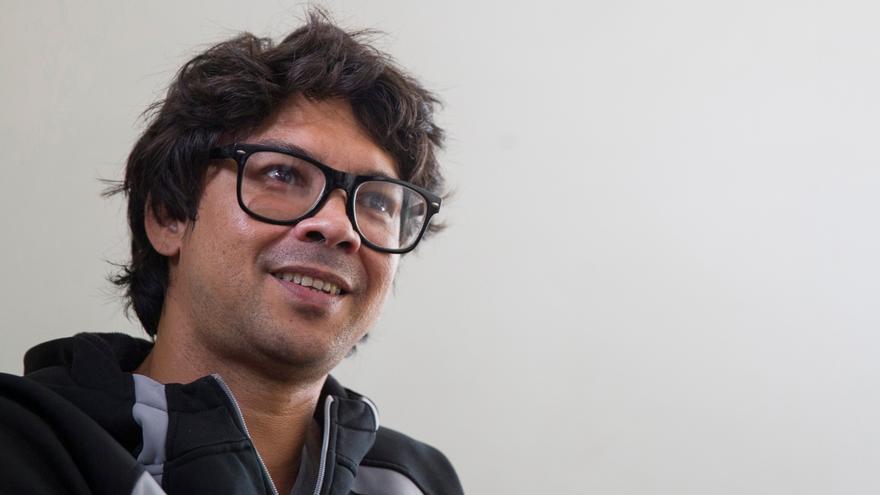
![]() 14ymedio/EFE, Havana, 13 November 2021 — The Faculty of Communication of the University of Havana has summoned its students to gather at the Quijote Park in El Vedado, on Sunday the 14th, precisely the place where the playwright Yunior García Aguilera will begin his journey to the Malecón carrying a white rose, as a way of personal and peaceful protest.
14ymedio/EFE, Havana, 13 November 2021 — The Faculty of Communication of the University of Havana has summoned its students to gather at the Quijote Park in El Vedado, on Sunday the 14th, precisely the place where the playwright Yunior García Aguilera will begin his journey to the Malecón carrying a white rose, as a way of personal and peaceful protest.
The activities announced on the faculty’s networks are presented as a “Great University Fair” that will begin this Saturday with events in the community of Berroa, in Guanabacoa. The invitation does not make any allusion to the independent Call to March or to García Aguilera.
However, the coincidence of the place and day of the University Fair has not gone unnoticed, a strategy that was used recently when a National Defense day was decreed for exactly the date, November 20th, when the Civic March was initially planned.
“Once again, the university is used as a spearhead for repression,” lamented journalist José Raúl Gallego on his Facebook account. “They organize a ‘great fair’ for the same place where Yunior García had announced days before that he would go out to march alone. There the student who lends himself for this.”
“The Faculty of Communication of the University of Havana, the place where I studied for a bachelor’s and a master’s degree, is happy to be part of this shame,” lamented the former university professor currently residing in Mexico.
For his part, Yunior García Aguilera acknowledged in an interview offered to the Spanish agency Efe that he is concerned and feels responsible for the possibility of repression against the protesters next Monday, a reason that does not make him back down in his will to exercise the right to demonstration.
“The multiparty system does not guarantee democracy, but the single party cancels it completely,” says the 39-year-old artist, one of the most visible faces of the Civic March for the Change of November 15, outlawed by the Government.
This Friday, in a television intervention, Miguel Díaz-Canel assured, in reference to this march, that they were “prepared to face any action” against “the revolution.”
When asked about the objective of the demonstration called for November 15, García replied that it is about “shaking a country, making people aware, generating a debate that causes changes.” In his opinion, a good part of the population has pretended not to be interested in political matters to avoid problems but thinks that “now people believe that they can achieve changes and are deciding to participate, especially the younger ones whose only hope was to leave the country.”
“Those who cannot leave or have decided to stay know that they must take charge of their destiny, participate in reality and bring about changes for their benefit. We want that to happen in the most peaceful and civic way possible,” he added.
García Aguilera affirmed that Archipiélago “is not a political party” and that it is “a plural platform.” He explained that they aspire to a “deep, real, transformative” national dialogue that does not exclude anyone, and takes into account the emigration of the exile and its result is expressed at the ballot box and says: “Hopefully we Cubans can decide in a plebiscite which country we want and it is not a question of which side beats another, or one dictatorship is replaced by another, but rather that the citizens will expresses itself in the most civic way possible.”
When this artist is asked about the threat of possible imprisonment as the date of the demonstration approaches, he said:
“If I go to prison, I will renounce the defense because I do not believe in the Cuban judicial system. From the moment they take me to prison my sentence will be written, and it does not matter what I say. Of course, I do not want to go to jail, I don’t know if I can be useful within it. Cuba needs people who work in freedom, not just martyrs or symbols. I don’t believe in that morbid belief that terrible things have to happen to change things.”
At the end of the interview, he defined himself as an artist who “is involved in social and political activism” but does not consider himself a politician. “Although they say that there is no dialogue with dictatorships, I believe in dialogue as a political solution and I am anti embargo (from the United States on Cuba). I cannot morally allow sanctions that make my family go hungry. Even if I stay alone, I’m going to defend my ideas and principles.”
____________
COLLABORATE WITH OUR WORK: The 14ymedio team is committed to practicing serious journalism that reflects Cuba’s reality in all its depth. Thank you for joining us on this long journey. We invite you to continue supporting us by becoming a member of 14ymedio now. Together we can continue transforming journalism in Cuba.
